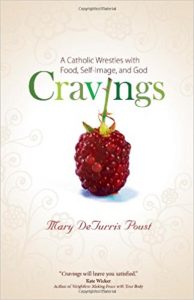Cravings: A Catholic Wrestles With Food, Self-Image and God
 Family meals eaten together around the kitchen table are “the key to a saner and happier home life.” Not only that, but family mealtimes also are “the key to a saner and healthier diet,” says Mary DeTurris Poust, author of “Cravings.”
Family meals eaten together around the kitchen table are “the key to a saner and happier home life.” Not only that, but family mealtimes also are “the key to a saner and healthier diet,” says Mary DeTurris Poust, author of “Cravings.”
She believes that a “family mealtime forces you to slow down, even if it’s just a little bit, and slowing down is always an important part of putting food and diet in perspective and on track.”
Slower mealtimes and slower eating overall are an important concern in “Cravings.” To a significant extent, this is a book about “how” to eat. “More mindful eating” and ways to “reframe our food-focused thinking” are central concerns here.
Because eating is one of the basics of family life, I enjoyed Poust’s observations on family meals. She has high hopes for these mealtimes. At the same time she is realistic and knows firsthand about the chaos and “noise” that may erupt from children around a dinner table.
Poust is married and has three children. A Catholic journalist and author, she resides in upstate New York.
Family meals are “critical for building real community among parents and children,” she writes. In my mind’s eye I could visualize the scene when her children join her in pizza making on a Friday evening.
It is “maybe not the most peaceful of moments, what with all the flour and cheese being tossed about, but a time verging on sacred because it combines homemade food lovingly made, my own little family community, the warmth of our home and the joy of eating a favorite meal together,” Poust writes.
She encourages readers to “consider renewing the tradition of Sunday dinner” in their families, “if not every week then once a month.” Include extended family members when possible, she recommends, and “watch how your own family blossoms as new ties are forged and strengthened.”
“Cravings,” however, is not about family life per se. In lots of ways it is about the spirituality of food. As such, it seems timely for Lent, a season when fasting holds a place of honor, along with prayer and almsgiving.
“Our culture tries to convince us on just about every front that more is better,” Poust writes. Today, she fears, meals are not so much “moments of connection and conversation” as occasions of “consumption and calories.”
But in these times, she suggests, “fasting helps us begin to distinguish between wants and needs, even when practiced in the most minimal ways.”
Meals in Poust’s view “need to be basic most of the time, feasts only on occasion.” However, she acknowledges, this viewpoint “stands in opposition to our American attitude of feasting whenever possible, even during a weekday lunch hour.”
Poust’s strong convictions about food do not imply that she disparages the joys of eating. “Our “spiritual journey does not require us to leave behind all the delights of this world,” she insists.
Pointing to certain resemblances between the foods of daily life and the eucharistic Bread of Life, she explains:
“We eat of Communion so that we may live. We bless our spiritual food, say ‘Amen,’ and silently reflect on the significance of what we have just consumed not only into our bodies but into our hearts. It is possible to give our everyday meals a similar sense of the sacred, thereby transforming food from something that fills us up into something that truly nourishes.”
Today, a “multipronged approach” to food habits is needed, Poust believes. In addition to selecting healthier foods and “reshaping old habits,” it is necessary to refocus “our spiritual energy.”
In that vein, “Cravings” invites readers to consider what hunger they are feeding when they make food decisions that, perhaps, they regret later. A common problem, as Poust sees it, is that “we attempt to feed our hunger – for God, for others, for love, for understanding, for success and more – with momentary bites that never satisfy.”
Disclaimer: Book reviews do not imply and are not to be used as official endorsement by the USCCB of the work or those associated with the work. Book reviews are solely intended as a resource regarding publications that might be of interest to For Your Marriage visitors.




